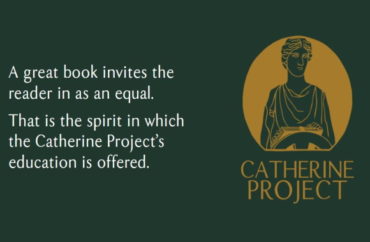
A free online education project born during COVID celebrates its second year of growth
Philosopher Zena Hitz and her team of educators are determined to offer a great books education for free to anyone who wants one.
Hitz, a tutor at St. John’s College and author of “Lost in Thought: The Hidden Pleasures of an Intellectual Life,” teamed up with like-minded teachers and students in 2020 to assemble an online humanities program, structured around a set of reading tutorials of fundamental works. The program is modeled in part on the great books curriculum at St. John’s College, but it has no university affiliation and is free of grades, tuition, fees, degree requirements and administrators, according to its website.
The founders of the program named it the Catherine Project after the 4th century Christian Egyptian martyr St. Catherine of Alexandria, the patron saint of philosophers and scholars, according to Britannica.
The Fix caught up with Jordan Poyner, The Catherine Project’s executive director, following a recent virtual town hall meeting to discuss the state of the project and his team’s plans for keeping the love of the humanities alive.
In a December 2021 interview with The College Fix, Hitz explained the rationale of their enterprise. “Through liberal education, we learn about the modes of human flourishing and the limitations that face it,” she said. “We are then empowered to devise forms of work and other activities that build that flourishing.”
The following interview with Jordan Poyner has been edited.
The College Fix: Your team is strongly committed to keeping the Catherine Project free for all. Other than donations, what other sources of revenue are you pursuing? Can you say anything about your financial health at this time?
Jordan Poyner: Like many nonprofits, funding is an ongoing concern for us, but we want to be discerning about where that funding comes from. The Catherine Project is actively pursuing grant opportunities that won’t force us to compromise on our principles. However, as an institution, the Project was always intended to live or die with the enthusiasm of its members. The freely given support of our community holds us accountable for providing something of real value and demonstrates the stake readers take in the community.
TCF: Your offerings seem very popular — every time I visited your website, registration has been closed! Can you recommend any similar projects or offerings from other organizations?
JP: Our registration periods are generally December-January (for Spring term), April-May (for Summer), and July-August (for Fall). We also offer single-session seminars mid-Spring and mid-Fall, as well as spontaneously organize reading groups via our mailing list. We recommend that those wishing to study with us join our mailing list.
We do always receive far more applications to study with us than we can accommodate and I am aware of [similar] opportunities that might be of interest, including The Agora Foundation, Premise, Symposium, and in-person reading groups with the Great Books Foundation. Vydol is an an app that aims to teach the art of close reading by example. They publish videos of professors working through classic texts one paragraph at a time, discussing each section as they go.
TCF: What are the requirements to volunteer as a tutor? As a reading group leader?
JP: Tutors and reading group leaders should have an affinity for our approach to conversation-based inquiry or seminar. We are greatly influenced by the approach cultivated at St. John’s College, so some familiarity with that school’s culture is helpful. In general, we recommend that those who are interested in volunteering to lead a tutorial or reading group participate in one first. Reading groups are peer-led by individuals who are skilled at facilitating conversation, while tutors should have a PhD or some other experience working in-depth on an intellectual project.
TCF: Why do you appoint a leader to the discussion groups, rather than simply organizing a meeting of readers?
JP: Our reading groups have leaders because we believe that the habits conducive to the serious and shared study of a text are not widely cultivated today. A principal aim of the Project is to help in cultivating those habits. Reading group leaders are expected to model good habits and encourage them in others. Our tutors and reading group leaders help readers think together, not tell them what to think.
TCF: How is your retention rate? It seems that those who begin the seminars generally complete them. If that is the case, to what do you attribute that success?
JP: As you might imagine, retention rates in our courses can vary dramatically. Someone might think they want to read Hegel, for example, and, understandably, find out they don’t! More generally, the Project is quite idiosyncratic and it is not uncommon for readers to come to the realization that, for a variety of reasons, it’s not what they expected or desired. Our reading groups are intentionally over-enrolled to account for some attrition (that is, we typically enroll 14 readers, aiming for a core of 9-10). Spaces in our tutorials are much more limited and we ask applicants to take seriously the privilege of participating and consider carefully whether they can commit to the course.
TCF: Your tutorials seem focused on Western works, though they include some texts from the rest of the world. Do you consciously emphasize the works of the West, and if so, why?
JP: It’s true that most of our tutorials study works that are understood as Western, but we’re fundamentally committed to reading books of richness, depth, and lasting value—regardless of which canon they are understood to belong to. We do not currently have a curriculum in place, which means the subjects of our tutorials are decided on a case-by-case basis in consultation with our volunteer faculty. If our tutors want to read the great books of other canons, we’re open to that!
TCF: Is there anything else you’d like our readers to know?
JP: The Catherine Project is intended to be a place where anyone can read and think alongside others: all are welcome!
Participation is open to all adults 16 or older, regardless of educational background, according to the Catherine Project website.
MORE: Humanities majors are thriving at Grove City College, bucking trend of decline
IMAGE: Catherine Project
Like The College Fix on Facebook / Follow us on Twitter






Please join the conversation about our stories on Facebook, Twitter, Instagram, Reddit, MeWe, Rumble, Gab, Minds and Gettr.